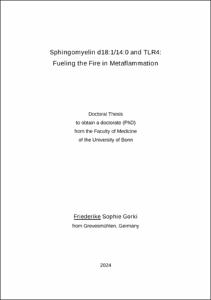Sphingomyelin d18:1/14:0 and TLR4: Fueling the Fire in Metaflammation

Sphingomyelin d18:1/14:0 and TLR4: Fueling the Fire in Metaflammation

| dc.contributor.advisor | Düwell, Peter | |
| dc.contributor.author | Gorki, Friederike Sophie | |
| dc.date.accessioned | 2024-02-29T08:23:16Z | |
| dc.date.available | 2024-02-29T08:23:16Z | |
| dc.date.issued | 29.02.2024 | |
| dc.identifier.uri | https://hdl.handle.net/20.500.11811/11368 | |
| dc.description.abstract | Metaflammation, the chronic low-grade inflammation originating from metabolic organs such as adipose tissue and liver, is associated with many prevalent non-communicable diseases such as obesity, type 2 diabetes and atherosclerosis. Although we have developed a profound knowledge on the underlying disease mechanisms, the immediate triggers of metaflammation remain obscure. Here, an unbiased discovery approach was utilized to identify non-genetic factors that influence diet-induced atherosclerosis progression in mice. Integration of various parameters including thousands of host- and microbe-derived features not only confirmed well-known pro- and anti-atherogenic factors, but identified the endogenous lipid sphingomyelin d18:1/14:0 (S14) as highly associated with disease severity. In vitro, S14 was shown to activate pro-inflammatory innate immune signaling in macrophages in a manner that was fully dependent on TLR4 and MD-2. Molecular dynamic simulations, biochemical and cell-based analyses confirmed a direct interaction of S14 with TLR4/MD-2, promoting the formation of active TLR4/MD-2 dimers that subsequently mediated both MyD88- and TRIF-dependent signaling downstream of TLR4. Interventional studies in mice and humans confirmed the machine-learning predictions and previous literature, demonstrating that S14 concentrations are altered by dietary changes, and that an increase in S14 is associated with markers of cardiovascular disease and obesity. Collectively, the findings presented in this thesis propose a novel, host-derived TLR4 ligand of inducible nature that potentially fuels metaflammation secondary to contemporary Western-type lifestyle habits. | en |
| dc.language.iso | eng | |
| dc.rights | Namensnennung 4.0 International | |
| dc.rights.uri | http://creativecommons.org/licenses/by/4.0/ | |
| dc.subject | Immunologie | |
| dc.subject | TLR4 | |
| dc.subject | Entzündung | |
| dc.subject | Arteriosklerose | |
| dc.subject | Sphingolipide | |
| dc.subject | Immunology | |
| dc.subject | Inflammation | |
| dc.subject | Atherosclerosis | |
| dc.subject.ddc | 610 Medizin, Gesundheit | |
| dc.title | Sphingomyelin d18:1/14:0 and TLR4: Fueling the Fire in Metaflammation | |
| dc.type | Dissertation oder Habilitation | |
| dc.publisher.name | Universitäts- und Landesbibliothek Bonn | |
| dc.publisher.location | Bonn | |
| dc.rights.accessRights | openAccess | |
| dc.identifier.urn | https://nbn-resolving.org/urn:nbn:de:hbz:5-74874 | |
| dc.relation.doi | https://doi.org/10.21203/rs.3.rs-2792338/v1 | |
| ulbbn.pubtype | Erstveröffentlichung | |
| ulbbnediss.affiliation.name | Rheinische Friedrich-Wilhelms-Universität Bonn | |
| ulbbnediss.affiliation.location | Bonn | |
| ulbbnediss.thesis.level | Dissertation | |
| ulbbnediss.dissID | 7487 | |
| ulbbnediss.date.accepted | 19.02.2024 | |
| ulbbnediss.dissNotes.extern | Supervisor: Eicke Latz | |
| ulbbnediss.institute | Medizinische Fakultät / Institute : Institut für Angeborene Immunität | |
| ulbbnediss.fakultaet | Medizinische Fakultät | |
| dc.contributor.coReferee | Geyer, Matthias | |
| ulbbnediss.contributor.orcid | https://orcid.org/0000-0001-7718-5566 |
Dateien zu dieser Ressource
Das Dokument erscheint in:
-
E-Dissertationen (2056)




